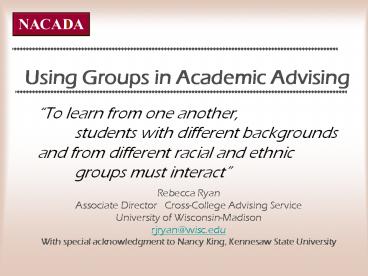Using Groups in Academic Advising PowerPoint PPT Presentation
Title: Using Groups in Academic Advising
1
Using Groups in Academic Advising
To learn from one another, students with
different backgrounds and from different racial
and ethnic groups must interact
- Rebecca Ryan
- Associate Director Cross-College Advising
Service - University of Wisconsin-Madison
- rjryan_at_wisc.edu
- With special acknowledgment to Nancy King,
Kennesaw State University
2
This session
- What is Group Advising?
- Reasons for offering group advising
- Benefits and Challenges
- Making groups personal
- Designing and Assessing
- Sharing ideas
3
What is Group Advising?
- Orientation programs
- Freshman seminars and/or capstone courses
- Freshmen Interest Groups (FIG)
- Learning communities/Residence hall groups
- Groups by common interest or special populations
(honors/International students/etc.) - Pre-enrollment meetings/group discussions
- Common reads/Book clubs
4
Why consider groups?
Variety chance to offer information in different
ways, appeal to a larger base
Necessity Advisor/Advisee ratio time
constraints Proactive vs. reactive
Building Community establishing peer groups
support and collaborate with other units
Content Advising is Teaching presenting baseline
information to a group can increase a consistent
message
?
5
Why use a group approach?
- Necessity (Advisor/Advisee ratio time
constraints Proactive vs. reactive) - Variety (chance to offer information in different
ways, appeal to a larger base) - Building community (establishing peer groups
support and collaborate with other units) - Content (Advising is Teaching presenting
baseline information to a group can increase a
consistent message) - Other ideas?
6
Group Advising benefits
- Can be an important supplement to one-to-one
advising - Needs to incorporate principles of developmental
advising philosophy - Should be a student-centered process in which
advising is a shared responsibility - Can enhance peer involvement and the learning
community environment
7
Group Advising Challenges
- Impersonal setting?
- Presentation ability
- Group dynamics
- Attendance
- Not enough time and/or staff for many individual
inquiries following program - No clear agenda or motivation for the group
session - Used as a substitute for other types of advising?
- Timely topic?
- Captive audience?
8
Making Groups personal?
Apply developmental principles!
- Advising is a shared responsibility between
advisor and advisee - Advising contributes to the development of
problem solving skills, decision-making skills,
exploration of academic and career interests - Advising, when done well, is a form of
teachinggroup advising is a prime example of
this.
9
Designing Group sessions
- Choose your perspective
- Informational, Relational, Conceptual
- Considerations
- Venue, timing, staffing (peers?), tracking
attendance - Getting the word out
- List-serves, email, posters, handbills, etc.
- Preparation
- What do you need? What do the students need?
10
Content Examples
- Informational
- How to use the student center
- What requirements do you have?
- Conceptual
- Understanding a degree vs. and education
- How to use a big picture approach to your
educational experience - Relational
- Use interactive exercises, group discussions, and
team building
11
Who should be involved?
- Advisors, Counselors, Faculty
- Administrators
- Students (keynotes, panelists, small group
facilitators) - Experts (student leadership, team building,
student success, etc. - Guest speakers
- Entertainers
- Others?
12
Your skills are TRANSFERABLE!
Do you possess
- An understanding of group dynamics?
- Knowledge of student development?
- Strong facilitation skills?
- Confident and solid public speaking skills?
- Collaborative, team playing attitude?
- Adaptable problem-solving?
- A sense of humor?
13
Successful group advising depends on
- Positive group dynamics/facilitation strategies
- Introductions icebreakers group activities
- Agenda and outline for program, goals clearly
defined, program is aligned with learning
outcomes - A climate of mutual trust and respect
- Interaction among participants
- Advisor knowledge of broader campus resources,
institutional policies procedures - Engaging materials/handouts
- Time for questions
- Evaluation and Feedback
14
Assessment of Group Advising
- Both formative and summative evaluation should be
done - Pre- and post- measures are helpful
- What learning outcomes are you attempting to
address? - How does the group fit with the overall mission
of the unit? The institution? - Feedback should be collected from the attendees,
advisors, and administrators as necessary
15
Thoughts
- When done well, Group advising may
- Aid retention
- Ease advisor loads
- Connect students with a peer group
- Promote inter-unit collaborations
- It DOES NOT replace one-to-one advising,
- but rather ENHANCES it!
16
Conclusion
- Regardless of the type of student, or the
advising format used, keep in mind two thoughts - An excellent adviser does the same for the
students entire curriculum that the excellent
teacher does for one course. Mark
Lowenstein, 2005 - Good Advising may be the single most
underestimated characteristic of a successful
college experience - Richard Light, Making the Most of College, 2001

